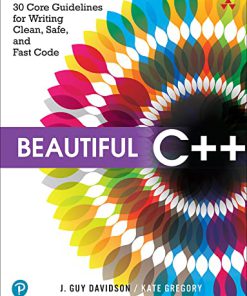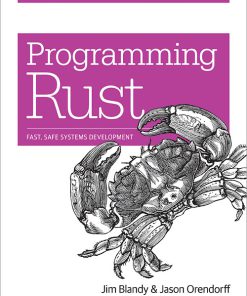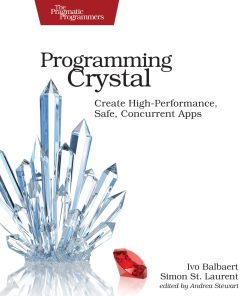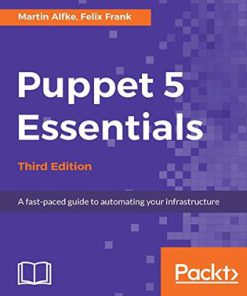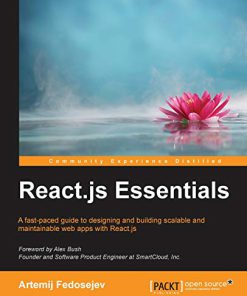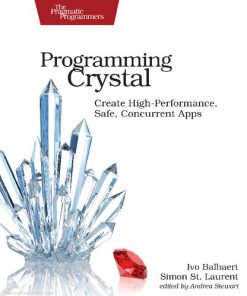Rust Essentials A quick guide to writing fast safe and concurrent systems and applications 1st Edition by Ivo Balbaert ISBN 1788390016 9781788390019
$50.00 Original price was: $50.00.$25.00Current price is: $25.00.
Rust Essentials A quick guide to writing fast safe and concurrent systems and applications 1st Edition by Ivo Balbaert – Ebook PDF Instant Download/Delivery: 1788390016, 9781788390019
Full download Rust Essentials A quick guide to writing fast safe and concurrent systems and applications 1st Edition after payment
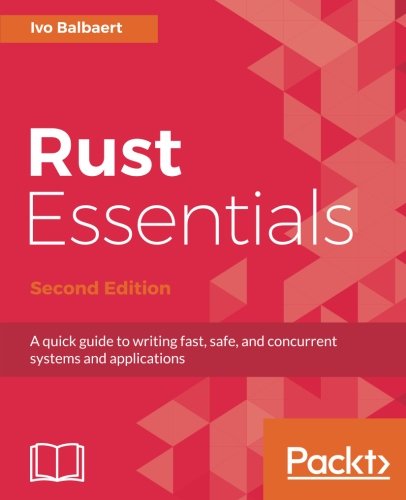
Product details:
ISBN 10: 1788390016
ISBN 13: 9781788390019
Author: Ivo Balbaert
Rust is the new, open source, fast, and safe systems programming language for the 21st century, developed at Mozilla Research, and with a steadily growing community. It was created to solve the dilemma between high-level, slow code with minimal control over the system, and low-level, fast code with maximum system control. It is no longer necessary to learn C/C++ to develop resource intensive and low-level systems applications. This book will give you a head start to solve systems programming and application tasks with Rust.
We start off with an argumentation of Rust’s unique place in today’s landscape of programming languages. You’ll install Rust and learn how to work with its package manager Cargo. The various concepts are introduced step by step: variables, types, functions, and control structures to lay the groundwork. Then we explore more structured data such as strings, arrays, and enums, and you’ll see how pattern matching works.
Throughout all this, we stress the unique ways of reasoning that the Rust compiler uses to produce safe code. Next we look at Rust’s specific way of error handling, and the overall importance of traits in Rust code. The pillar of memory safety is treated in depth as we explore the various pointer kinds. Next, you’ll see how macros can simplify code generation, and how to compose bigger projects with modules and crates. Finally, you’ll discover how we can write safe concurrent code in Rust and interface with C programs, get a view of the Rust ecosystem, and explore the use of the standard library.
Rust Essentials A quick guide to writing fast safe and concurrent systems and applications 1st Table of contents:
-
Chapter 1: Getting Started with Rust
- Rust Syntax and Structure: A Basic Introduction
- Your First Rust Program: “Hello, World!”
- Understanding Cargo: Rust’s Build System and Package Manager
-
Chapter 2: Rust’s Ownership and Borrowing
- Ownership Rules and Memory Management Without a Garbage Collector
- Borrowing and References: How Rust Guarantees Safety
- The Lifetimes Concept: Ensuring Valid References
-
Chapter 3: Data Types, Variables, and Functions
- Primitive Data Types in Rust
- Declaring and Using Variables
- Functions: Parameters, Return Types, and Closures
- Pattern Matching and Enums
-
Chapter 4: Error Handling in Rust
- The Result Type: Safe Error Handling
- Using the Option Type for Handling Null or Missing Values
- Propagating Errors with the
?Operator
-
Chapter 5: Concurrency and Parallelism in Rust
- Introduction to Concurrency in Rust
- Threads and the
std::threadModule - The
MutexandRwLockfor Synchronization - Channels for Safe Communication Between Threads
-
Chapter 6: Collections and Iterators
- Using Vectors, HashMaps, and Other Collections
- Iterators and Lazy Evaluation in Rust
- Higher-Order Functions and Combinators
-
Chapter 7: Working with Structs and Traits
- Defining and Using Structs for Data Representation
- Implementing Traits for Extensibility and Polymorphism
- The
DerefandDropTraits for Resource Management
-
Chapter 8: Writing Safe and Efficient Code
- Best Practices for Memory Safety in Rust
- Avoiding Data Races with Rust’s Concurrency Model
- Optimizing for Performance Without Sacrificing Safety
-
Chapter 9: Asynchronous Programming in Rust
- Introduction to Asynchronous Programming and the
async/awaitSyntax - Working with Futures and Streams
- Using the
tokioandasync-stdCrates for Asynchronous IO
- Introduction to Asynchronous Programming and the
-
Chapter 10: Building and Testing Applications
- Writing Unit Tests and Integration Tests in Rust
- Using Rust’s Testing Framework and Assertions
- Building Real-World Applications with Rust
-
Chapter 11: Advanced Rust Features
- Macros: Writing and Using Rust Macros
- Unsafe Rust: Understanding and Safely Using the
unsafeKeyword - Writing FFI Code to Interact with Other Languages (e.g., C)
-
Chapter 12: Deploying Rust Applications
- Packaging and Distributing Rust Projects
- Cross-Compiling for Different Platforms
- Deploying Rust Applications to Production
People also search for Rust Essentials A quick guide to writing fast safe and concurrent systems and applications 1st:
rust essentials
rust essentials pdf
rust essentials hoodie
rust essentials second edition
rust essentials plugin
Tags:
Ivo Balbaert,Rust Essentials,quick guide,writing fast safe,concurrent systems
You may also like…
Computers - Programming
Beautiful C 30 Core Guidelines for Writing Clean Safe and Fast Code 1st Edition Davidson
Computers - Programming
Computers - Programming
Romance - Contemporary Romance
Kissing Kringle (A Forever Safe Christmas Book 10) 1st Edition K.L. Fast & M.K. Moore [Fast
Computers
Programming Crystal: Create High-Performance, Safe, Concurrent Apps 1st Edition Ivo Balbaert




